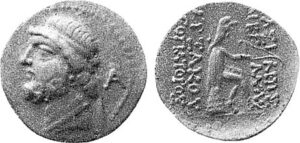Following the expansions of the territories of the Parthian Empire, it was necessary to defend them. The era of Mihrdāt I was followed by a turbulent period.
A Narrative by Varan
Frahāt II
The successor to the throne of Mihrdāt I became Frahāt II, the son of the former, in 138 BC. Because the new king was too young, the affairs of state were initially taken over by his mother Ri-nu.
His active reign was marked by resurging multi-front wars. While Frahāt II led a battle in the east against the Sakas, the Greek Seleucid Antiochos VII Sidetes took advantage of this and assembled a large army against Parthian Babylonia (Ellerbrock, Winkelmann 2012: 56), bringing the west of the Parthian Empire, i.e. Mesopotamia, under his control.
In order to confront the Seleucid army in Mesopotamia, the Parthian army passed through the entire Eran to the west after the battle in the east. In the spring of 129 B.C., Frahāt II managed to defeat the Greek Antiochos VII and recapture the territories (Schippmann 1980: 27). This circumstance was in turn exploited by Sakic and Tocharian nomads in the northeast, who invaded the Parthian empire. They overran and plundered Bactria between 130 and 128 BC, which is why Frahāt II was forced to march back east with the Parthian army (Ellerbrock, Winkelmann 2012: 57). Frahāt II fell in battle against the Sakas.

Fig. 1: Frahāt II. Portrait head l., bearded and diad. King as archer r., seated. Sylloge Nummorum Graecorum.
Ardawān I
Ardawān I (127-124 B.C.), the brother of Mihrdāt I, subsequently assumed the office of king of the Parthians and immediately became involved in multi-front warfare as well. He temporarily lost parts of Mesopotamia to the Seleucids and continued the war in the east. In battle against the Sakas, it is said, he died from a poisoned weapon (ibid.).
The period of Frahāt II and Ardawān I mark a bloody and warlike chapter of the Parthians. While the Seleucids attempted conquest in the west, nomadic tribes of the Sakas and Tocharians increasingly invaded the east. Eternal, never-ending wars on the fronts characterized this period.
List of References
Ellerbrock, U., Winkelmann, S. 2012. Die Parther – Die vergessene Grossmacht. Philipp von Zabern Verlag, Darmstadt.
Schippmann, Klaus. 1980. Grundzüge der parthischen Geschichte (Grundzüge XXXIX). Darmstadt: Wissenschaftliche Buchgesellschaft.


